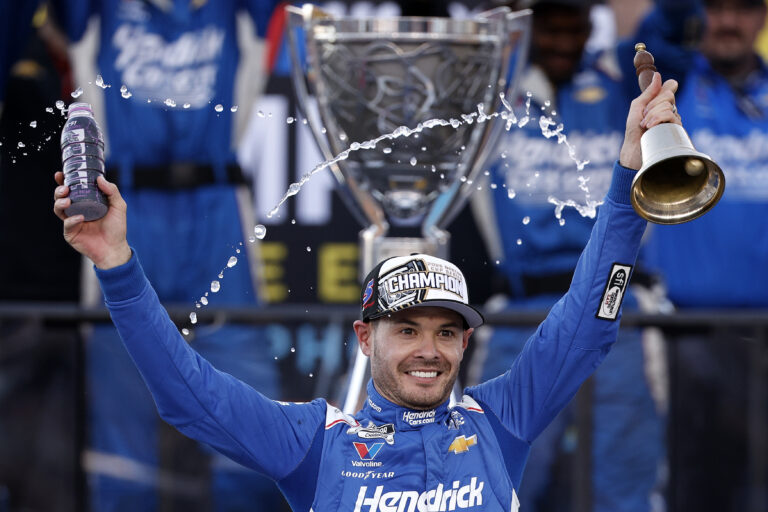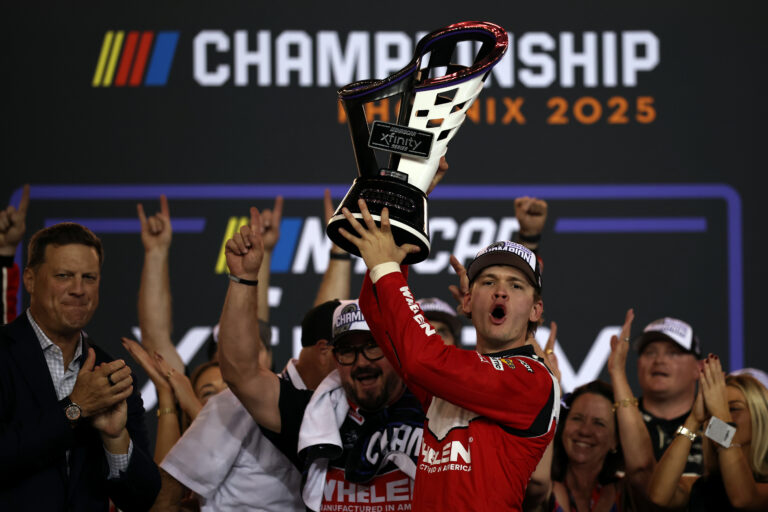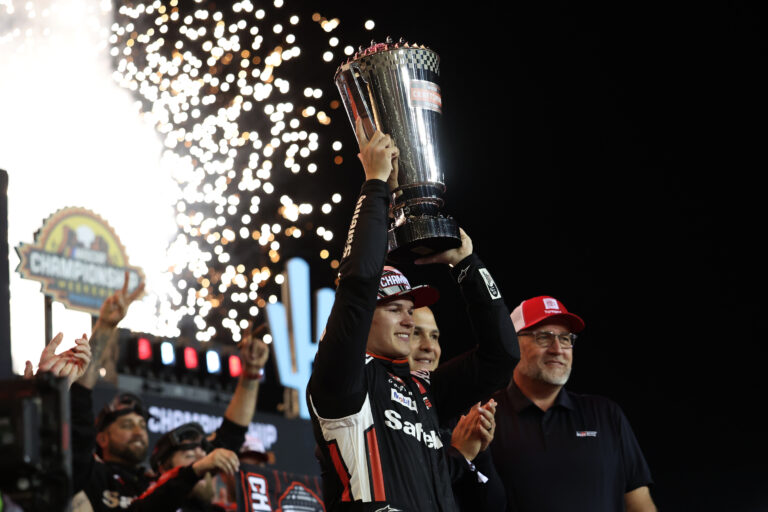
Photo Credit: Noel Lanier/OnPitRoad.com
On November 20, 2016 NASCAR history was made as Jimmie Johnson claimed his seventh Sprint Cup series championship, tying Richard Petty and Dale Earnhardt Sr. Before this historic feat can even be celebrated many detractors are already arguing that Johnson’s championships are not as good as those of Petty and Earnhardt. I completely disagree. Johnson has captured seven Sprint Cup Championships in an era of closer competition, stricter rules, and fewer starts compared to Petty and Earnhardt.
Richard Petty earned his championships under six different points systems. In Petty’s era, there were often only a small number of competitive teams racing weekly.
Petty earned his first championship in 1964, in which he competed in 61 of 62 races. Only one other driver competed in 61 events that season, the others were not even close. His 1967 championship season had eleven different winners in 49 races, with Petty winning 27 races.
Earnhardt’s championships also came in a different era of the sport. During Earnhardt’s era, the racing was different; the cars were different; the safety was better. However, similar to the Petty era, many of those seasons consisted of cars that could still finish in the top-three, despite being several laps down. During Earnhardt’s career, most seasons consisted of 30 races, with the most being 34.
Johnson has won all seven championships in the modern era. The competition is much closer. In the 2006 season, the start of Johnson’s five consecutive titles, the majority of the races had over half the field on the lead lap and a margin of victory less than one second. Regardless if you are a Johnson fan or not, you cannot deny that winning seven championships in any era of our sport, or any sport for that matter, is something that takes a high degree of skill.
NASCAR has undergone many changes over the years, some have been positive and some have been negative, but the argument that today’s racing is less competitive than in earlier eras is not valid. Petty ran 1,185 races in his career. Earnhardt and Johnson combined have 1,219 starts. Therefore, in less total races, more competitive fields, and stricter rules, it’s harder to argue the point that Johnson had an easier route to his seven championships.
Before you put an asterisk beside Johnson’s name in the record books because you feel his championships are not as good, truly think about what it took to reach this monumental milestone. Johnson, Petty, and Earnhardt are the only three drivers in NASCAR history to win seven championships, but Johnson accomplished this in an era of closer competition, stricter rules, and less scheduled races per season. Again, regardless of which side of the argument you side on, you must respect the level of talent it takes to reach that level of perfection.
**The opinions expressed on this site are not necessarily those of the publisher, management or staff. All comments other than website related problems need to be directed to the author. (c)OnPitRoad.com. **





Petty’s strongest competitor was David Pearson, did he ever run a whole season for the chamionship?
Jim – thanks for reading and thank you for the question. Pearson never ran a full season, even with his three championships. He came close in 1964, entering 61 of 62.
The difference between now and then is that it not only takes skill but a bit of luck as well. which does make it harder.. That luck part is where it is said that the true Champion may not have been crowned.. That is even more so true after the invention of the Elimination Chase. In the Normal chase you still had to be really good for just under a third of the season which is where Jimmie excelled (and won the majority of his championships). So did Jimmie luck into this one his seventh, The answer is yes, as if certain things didn’t happen (during THAT race) he would not be champion, BUT, he was also in the place he needed to be with the skills to get it done when he needed to to win it. In general the big difference Now from then is that because of this element of luck I think it makes all teams better and the competition goes up. 9 times out of 10 you will see the top Chase Drivers (championship competitors) being in 8 or 9 of the top positions.. They are all wanting that championship and racing for it. You don’t get there consistently without being able to seal the deal eventually.
Thank you for your comment Brion. You have an interesting take on this subject. Are you stating that luck never played a part in past championships? If so, I would invite you to research the 1973 championship season of Benny Parsons. I feel that luck definitely played a part in that title.
the championship comes down to the last ten races, if you have a win make the top 16 ( or top 30 with a win)your in .one reason Jimmy won 7 is the last ten races are at some of his best tracks. the best team /driver of the season doesn’t always win the championship one EXAMPLE Harvick.
To me the chase comes to more luck than anything else you are either at the right place or wrong place and out of your control
Thank you for your comment “old NASCAR”. You are correct, it is much different now than in the past, however, all 40 drivers are using the same system. Each one has the same opportunity as Johnson. I agree with Mike (the writer), I feel it is as impressive of an accomplishment as the other drivers.
Earnhardt ran a maximum of 34 races in any season; Johnson has run 36 each season he has competed. It must be Common Core math to state that 34 is more than 36, but you did it twice. Unless you are only counting the 10 Chase races.
Michael –
First, thanks for reading and thank you for your comment. In my final paragraph, I was simply providing an overall recap of my points. When I stated “less scheduled races per season” I was actually referring to Petty’s season. I did not, however, specifically make that distinction. Thank you for pointing that out. As I said, it was an overall recap.
In the paragraph before that, I referred to “less total races”. I actually added Earnhardt’s and Johnson’s total starts together to point out that together they barely had more than Petty alone. However, if you want to get technical, Johnson currently has 543 starts compared to Earnhardt’s 676. Therefore, no matter what math you use, Johnson accomplished this impressive goal in 133 less starts than did Earnhardt. That is almost 4 seasons worth of starts based on the rate of 34 per season in the Earnhardt era.
Earnhardt was one of the best drivers this sport has ever seen, no one can deny that. But to say Johnson’s accomplishment is less than that of Earnhardt or Petty is simply not based in fact.
Thanks for the feedback!
Okay, once again: in the first paragraph you stated that Johnson did it in “fewer races per season as compared to Petty and Earnhardt”. As compared to Petty’s three pre-modern era seasons, I agree. However, Petty’s final four titles and all seven of Earnhardt’s titles were accomplished in seasons with 34 or fewer races, not 36. Am I nitpicking? Perhaps. But that statement is in error.